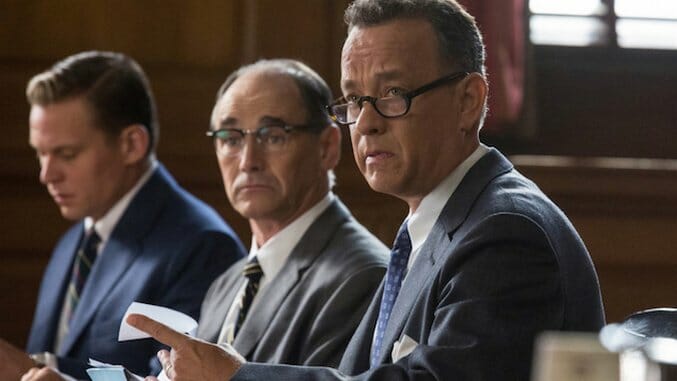Bridge of Spies

In the 14 years since the cataclysmic events of September 11, 2001, Steven Spielberg has directed only two films set in the present day, the back-to-back releases The Terminal and War of the Worlds (2004 and 2005, respectively). Everything else has been set in either the future (Minority Report) or the past (Munich, Lincoln, etc.). Yet no American director has been so engaged with the issues and complexities of post-9/11 America; every single one of Spielberg’s post-A.I. movies is as much about its own time as the period being depicted, and the director’s vision of America’s promise and its betrayal has grown increasingly despairing over the years. Even the relatively lightweight Indiana Jones and the Kingdom of the Crystal Skull contains lines like “I barely recognize this country anymore,” a sentiment at the heart of all of Spielberg’s later work.
Minority Report, which was shot before the Twin Towers fell but released in 2002, remains one of the most astonishingly prescient films of its time, with its vivid evocation of a society in which civil liberties and free will have been made subservient to government surveillance and a world of individually targeted marketing. The films that follow examine America’s evolving (or devolving) views on immigration (The Terminal), terrorism and the appropriate responses to it (War of the Worlds, Munich), and race (Lincoln). Even the most conventionally “entertaining” recent Spielberg pictures are sad and deeply disturbing at the core; the ultimately upbeat The Terminal, for example, presents an unforgiving view of the abandonment of our country’s principles as a nation of immigrants, and depicts post-9/11 Homeland Security bureaucracy with depressing accuracy.
Spielberg’s latest film, Bridge of Spies, fits right in with his recent preoccupations and expands upon them in typically provocative ways. Typically for Spielberg, that is; it must be noted that few American directors, and virtually none in the studio system, are tackling the kinds of difficult questions that he routinely addresses head-on. Once again the director tells a story set in the past but about the present: In 1957, American lawyer Jim Donovan (Tom Hanks) is called upon to defend Soviet spy Rudolf Abel (Mark Rylance) who is on trial for his life. Although taking the case makes him one of the most despised and misunderstood men in the country (not to mention his own home), Donovan throws himself into it with gusto. As he sees it, giving his client a proper defense vindicates and celebrates American values rather than undermining them.
-

-

-

-

-

-

-

-

-

-

-

-

-

-

-

-

-

-

-

-

-

-

-

-

-

-

-

-

-

-

-

-

-

-

-

-

-

-

-

-








































